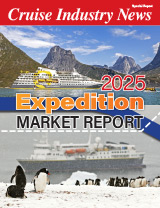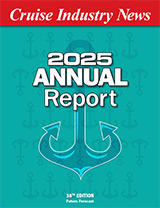The major role of the cruise lines in the 90s will be to convey the value of cruising, according to Rod McLeod, Executive Vice President of Royal Caribbean Cruise Line, who was the keynote speaker at the recent Cruise-Op conference in Miami.
McLeod said that the cruise industry’s growth is a direct result of cruise lines penetrating the consciousness of American vacationers and demonstrating cruising’s value for the money. “All inclusive vacations, including airfare, accommodations, meals, entertainment, and the convenience of having to unpack only once but still visit several different destinations, all in a safe environment, have tremendous appeal to a wide variety of people,” McLeod said. Yet, in spite of the millions of dollars spent on advertising, McLeod conceded that product awareness still remains low.
McLeod also said that the cruise industry has the potential for worldwide expansion to almost any destination that can be reached by water. “Naturally, this must be preceded by the development and enhancement of land and port facilities, services, transportation and tour operators,” he said.
McLeod noted that the growth of the industry, the number of ships, the investigation of worldwide destinations, expanded itineraries, and specialty and niche products meant “trickle-down” effects for local, national and international economies. Larger cruise lines means more jobs for a number of different groups according to McLeod who said that those benefiting from the industry’s healthy expansion ranged from building contractors to services to on board personnel to shoreside employees.
McLeod said that there would also be an increased need for vendors providing shipboard supplies such as foods, beverages, linens, paper products, and other services, as well as a demand for machinery for technical marine use and investment in capital expenditures. The industry-wide growth of cruise operators will stimulate the economy, and encourage expansion in affiliated industries, McLeod said.
Potential Problem Areas
McLeod said that the cruise industry is much larger today than during the 1982/83 recession and that the major operators would be less affected. McLeod said that costs were up across the board in the travel industry and that airline fares alone were up some 15.3 percent. Thus, he felt that cruising’s value was demonstrated better than ever.
McLeod said that the price of fuel has nothing to do with the price of a cruise ticket, although he said he did see how costs could impact the profitability of cruise lines to some extent.
“Only an increase in demand will allow us to increase prices,” McLeod said, who also said that there had been an increase in per diems over the last few years.
“There is nothing fundamentally wrong with discounting,” McLeod added, “it is the American way.” He said that he did not see discounting stopping.
McLeod noted that port congestion can be a problem, for example in Miami or San Juan. He also said that Caribbean controversy has focused primarily on hoteliers versus cruise lines. “There are also other island constituencies,” McLeod said, “that are very supportive, such as shopkeepers and taxi drivers.” He said that the cruise lines bring valued customers to the islands and that many later return as air visitors.
Fertile Seas
Adam Goldstein, Director of Market Development for RCCL, said that the cruise industry was a fertile industry for new products.
Goldstein said that while it has not been RCCL’s “mission” to do market development, “now we want to do things first,” he said. Goldstein said that RCCL was in fact interested in an attractive six month winter market. He said there were enough summer markets.
Goldstein identified the typical issues surrounding market developments. He said that a cruise line must identify a passenger source for a new market; plan its itinerary, including pre- and post-packaging; develop competitive pricing; and launch a promotional campaign.
Goldstein was also concerned that an established operator would look at the potential of product delivery, i.e., control of ground handlers and shipping agents as well as the local hotel situation, airlift, even the weather. There is also the element of political risk, according to Goldstein, who said that “political risk” was right on the “surface” of most major areas of the world.
“It is not enough that a particular product is exciting,” Goldstein said, “it must also be saleable.” He also stressed what he called the “vacation cycle”, i.e., the elapsed time from when the passenger leaves to when he or she returns. This can be no more than two weeks, Goldstein noted.
The lead time is also essential, according to Goldstein, who said that a new product needs long lead time, at least 18 months, for preparation, marketing and sales in advance of the first cruise.
On top of it all, you need “staying power”, Goldstein said, if you want to be involved in new market developments. Moreover, you needs guts and luck and the ability to say no, Goldstein concluded.
Issues
Also speaking at the conference, Commander D.M. Waldron of the U.S. Coast Guard expressed concern that the Caribbean islands were not able to properly process the garbage the cruise ships unloaded in port.
Tim Colton, President of Colton & Co. warned that the cruise lines would soon be running into a “PR problem” with their aging fleet. Colton said that passengers would soon reject older ships.
Colton also said that while new ships were being introduced, the average age of the cruise ship fleet would still be nearly 18 years by year 2000. He predicted what he called a “horrendous” shortage of shipyard capacity coming and urged cruise lines to take steps to ensure that they are not left out.
Colton suggested that cruise lines might negotiate long-term yard contracts, or even buy a shipyard.
Captain David Whitten, Deputy, Office of Marine, Safety, Security and Environmental Protection for the USCG, said that Coast Guard inspections frequently uncovered numerous violations and asked how this can happen when ships were inspected by classification societies as well and issued certificates.
Whitten wondered if ships should be rated on safety according to a lettering system that could rate ships a, b or c, to reflect level of maintenance as well as age.
Representatives for Det Norske Veritas and Lloyd’s Register of Shipping noted that classification was contingent on good management. They said that their societies only surveyed ships once a year and that they would be in order or corrected at that point in time.
Also speaking on cruise ship safety, Douglas MacGarvey, President of SeaEscape, said that the industry needs to correct misconceptlons about safety on cruise ships. He said that foreign-flagged cruise ships had the best safety record of any transportation mode during the last 20 years.
MacGarvey also said that regulations should improve safety but not stifle growth. He said that the regulatory development should be predictable and that cruise lines need lead time also for budgeting purposes. MacGarvey proposed the establishment of a cruise line advisory committee to work with the Coast Guard.
J. Michael Cavanaugh of the Washington. D.C. law firm, Graham and James, said that damage from bad press is limitless.
Cavanaugh said that there was a variety of legislative measures pending in Washington that could affect the cruise lines, and more than 20 federal agencies regulating aspects of the cruise industry, but that only three cruise lines maintained registered lobbyists in Washington, D.C.
Cavanaugh advised that the cruise lines should take action early to avoid confrontational relationships with federal agencies.



